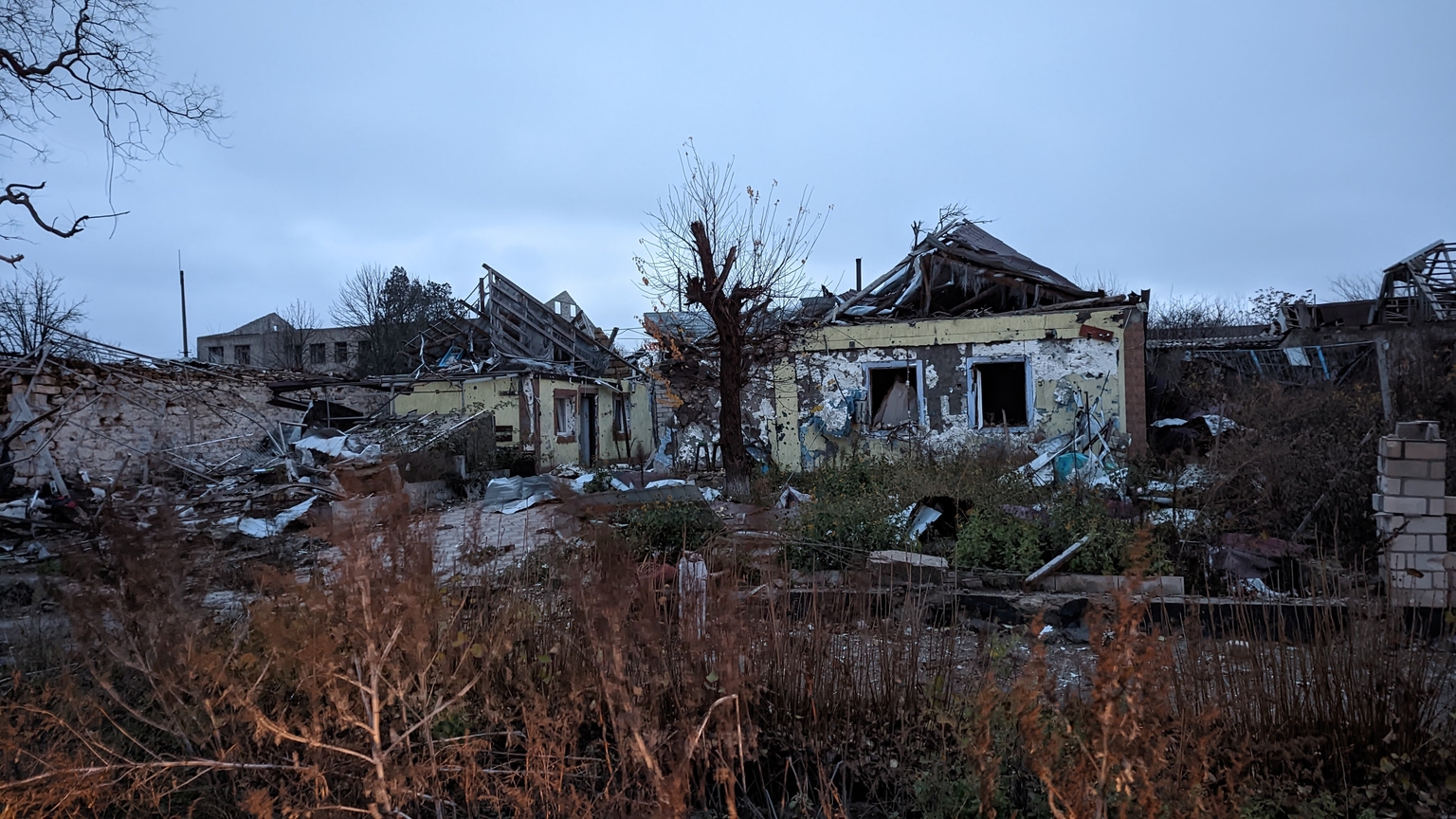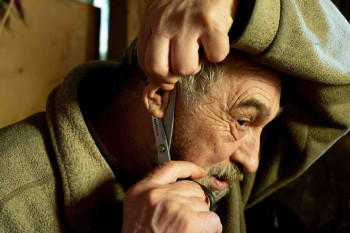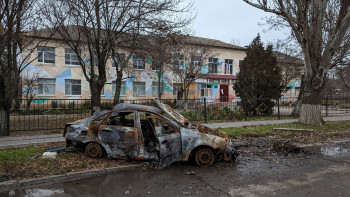Civilian investigators collect evidence of Russian war crimes in Ukraine

SNIHURIVKA, Mykolaiv Oblast — Early on Feb. 24, as Russian missiles started falling on Ukraine, a few human rights activists started a WhatsApp chat – right as they were sitting in bomb shelters.
The next day, the chat transformed into a human rights coalition aimed at protecting those affected by Russian aggression and later at bringing Russia's top leadership and the perpetrators of war crimes to justice.
The Ukraine 5 AM Coalition now consists of 31 Ukrainian and two foreign non-governmental organizations tasked with documenting thousands of alleged Russian war crimes in Ukraine.
Since the beginning of Russia's full-scale invasion, the coalition has used open-source information and visited crime scenes in the country's east and south to collect first-hand accounts of war crimes and crimes against humanity committed in Ukraine.
"We want to ensure that as many war crimes as possible are investigated," Tetiana Pechonchyk, who heads the Zmina human rights center, which is part of the coalition, told the Kyiv Independent.

The Prosecutor General’s Office is currently investigating more than 69,000 cases of war crimes and crimes of aggression allegedly committed by Russians since the beginning of the all-out war almost a year ago.
Russian forces have been consistently attacking residential buildings and vital public infrastructure in Ukraine. Evidence collected in the Ukrainian territories liberated from Russian occupation points to systematic violations, including murders of civilians, rape, torture, looting, and illegal displacement of Ukrainians to Russia.
According to the United Nations, 7,155 civilians have been confirmed killed and 11,662 injured in Ukraine since Feb. 24. However, the actual number of casualties is expected to be significantly higher, since data from occupied territories and areas with heavy hostilities is currently unavailable.
Tortured locals
It took months for Andrii Zherdiev to fully come to terms with what he had gone through while living under Russian occupation in Snihurivka, a town in the southern Ukrainian Mykolaiv Oblast.
Russia occupied Snihurivka, a strategic rail hub, from March until early November when Ukrainian troops liberated the area.
Zherdiev, who owns an accounting firm, lived peacefully in his hometown until Russians came knocking.
He was repeatedly interrogated, beaten, starved, and deprived of water at home and later in a cold jail cell with two wooden beds and a hole instead of a toilet.
Zherdiev's son, in his twenties, organized a resistance unit with some 30 residents of Snihurivka. It was easy for Russian forces to identify them in this small town with the help of dozens of local collaborators.
One day, Russian soldiers showed up at Zherdiev's door, looking for his son.
"They immediately put me on my knees," he said, with his voice trembling.
When he told the Russians that he did not organize or finance the resistance unit, one of the soldiers punched him in the face. Every answer he gave about his son was followed by a beating.
Russians locked Zherdiev in a local restaurant, one of the two places locals identified as Russian torture chambers.
He says he was interrogated by two Russians. One was torturing Zherdiev.
"Now I'll shoot your leg, and you will tell me everything," the Russian soldier told him, pointing his rifle at Zherdiev's leg. The other Russian calmly tried to convince him to turn his son in.
After the interrogation, as his home was being searched and burglarized, Zherdiev was told to show up at the local police station, which had been turned into another torture chamber in the town.
He complied, seeing no other option. At the police station, Zherdiev was beaten again before he was interrogated by the officer overseeing the jail.
"He liked his role. I heard him go into other cells and do the same," Zherdiev said, adding that the other cells were overcrowded, and some prisoners were interrogated right in the corridor.
The Russians gave Zherdiev two weeks to turn his son in, "otherwise, measures will be severe," he was told.
Zherdiev had no intention of giving up his son. He said that the local hospital and morgue were packed with bodies of those who actively resisted Russian occupation.
When he was released for the final time, Zherdiev took his son out of Snihurivka. He was helped by the local mayor, who had escaped to Ukrainian-controlled territory.
He disguised himself as an old woman in order to get out of his house undetected and left the occupied town using a colleague's passport, as the Russians were on the lookout for him and his son at their checkpoints.

“The mayor’s man gave me two hours to pack. We left in the afternoon through a Russian checkpoint,” Zherdiev said. “I returned to Snihurivka on the first day after liberation.”
According to Natalia, a nurse at the local hospital who remained in Snihurivka during occupation, some locals were admitted with explicit signs of torture. Natalia refused to provide her last name due to the fear of retaliation. The nurse showed photographs of two civilians who were brought to the hospital with signs of violent death.
Russian soldiers asked the hospital’s employees about those patients who complained, Natalia said.
To protect people, the staff registered patients under fake names to prevent the Russians from identifying victims or retaliating against those who spoke about the abuse.
Documenting war crimes
A three-person crew of civilian war crime investigators from Zmina are recording Zherdiev's testimony in the newly opened town hall in Snihurivka.
The crew combs through Zherdiev's experience, asking him about the uniform details – like chevrons or patches – of every person involved in his torture, along with their height, names, noms de guerre, and any other special identification marks.
Zherdiev's testimony is later uploaded by Zmina into the Norwegian-built Investigation Documentation System database, or I-DOC.
I-DOC is a tool to help investigators systematically analyze testimonies and evidence to gather all the required information concerning committed war crimes and help Ukraine's law enforcement launch trials.
Zmina's team lead Yelyzaveta Sokurenko keeps the record.
Sokurenko began working as a civilian war crimes investigator in September after spending two years reporting on hate crimes as a journalist.
Since then, she has been on the road through liberated areas of Kharkiv, Donetsk, Mykolaiv, and Kherson oblasts.
As Ukrainian forces liberate more territory, the amount of work Sokurenko and her colleagues face piles up.
An average of around 200 new investigations into potential Russian war crimes are opened each day across Ukraine by the Prosecutor General’s Office.
"Snihurivka is one big war crime," Sokurenko told the Kyiv Independent.
Not all atrocities committed during a conflict qualify as war crimes. An act must meet specific requirements of gravity and purpose to be classified as a war crime.
Zmina's project, funded by the Netherlands, mainly focuses on four types of potential war crimes: torture, forced deportation, abductions and unlawful imprisonments, and murder of civilians. Still, the team collects evidence of other types of crimes too.
“We document as much as possible," Sokurenko said.
Zmina’s 13-person team has documented over 1,100 alleged war crimes using open-source information along with some 100 first-hand accounts from victims and witnesses in their field investigations that started in September.

"Most of the evidence – or all the evidence that is produced – may well be usable," British barrister Geoffrey Nice told the Kyiv Independent.
"I dare say the NGOs are doing their very best (documenting the alleged war crimes), and with the best of intentions, but they don't always get that right. They can be helped," said Nice, who led the trial of ex-Serbian President Slobodan Milosevic at the International Criminal Tribunal for the former Yugoslavia.
Zmina is formally cooperating with the Prosecutor General's Office, according to Pechonchyk.
"We provide them with documented facts, stories, and testimonies. Zmina members are among the group of experts led by the Prosecutor General's Office," she said.
Zherdiev's testimony is the latest that Zmina's team has uploaded to I-DOC.
But this gathering of evidence and piecing together of war crime puzzles is a test run for Ukraine's judicial system.
The number of 69,000 investigations “is not final,” Pechonchyk said. “This is a task of unprecedented scale that will take more than one generation to document and investigate."
___________________________________________________________________________________________________________________________
Note from the author
Hey, this is Alexander Khrebet. Thank you for reading this story.
Law enforcement agencies are launching new investigations of Russian war crimes in Ukraine. But to report on Russian atrocities and visit the sites of war crimes, the Kyiv Independent team needs your support.
By donating to the Kyiv Independent and becoming our patron, you can help us keep telling the stories that matter.











